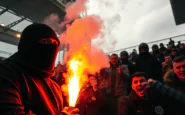Topics Covered
Riga, Latvia Fans of Beitar Jerusalem, known for their long and controversial history of anti-Arab racism, caused chaos during a UEFA Conference League qualifying match against Riga FC. It happened last Thursday, and police intervention was necessary to contain the situation. Imagine the scene: just a minute after kickoff, a fan wearing a balaclava launched fireworks from the stands, unleashing thick smoke and a partial fire in the away section.
How can a sporting event turn into a battlefield?
Details of the incident at Skonto Stadium
The match took a dramatic turn when a Beitar fan lit several firecrackers, breaking UEFA rules and prompting the intervention of the Latvian police. Online images show a cloud of black smoke rising above the stadium, as local fans look on in disbelief. In this setting, it's impossible not to notice a sign bearing the name of the fan group "La Familia," known for its violent behavior and racist songs. This group has a long and controversial history of conflicts with law enforcement, culminating in the 2016 arrest of 56 fans for weapons smuggling. But what drives young and old to behave this way? Is it just sport, or is there something deeper going on?
During the match, a fan displayed an Israeli flag, sparking enthusiasm from other supporters, but was quickly removed by stewards. Interestingly, Beitar Jerusalem has never signed an Arab player in its 89-year history, and has found support among right-wing political figures, including Israeli Minister Itamar Ben-Gvir. Currently, due to the Israeli-Palestinian conflict, the team plays its home games in Romania. What message does this send to those who love football and believe in the values of equality and respect?
Reactions and historical context
The match saw Beitar fans express their frustration after their 3-0 loss to Riga FC by setting off flares into traffic. Latvian police had to intervene to disperse the fans, some of whom were escorted away in vans. This unruly behavior is nothing new in European football, but it comes at a sensitive time. The conflict in Gaza has already claimed the lives of over 61.000 Palestinians, leading to calls for Israeli teams to be banned from European competitions. Is it right that sport is being used as a stage for geopolitical tensions?
FIFA has been accused of double standards in its handling of requests to suspend Israeli teams, while in the case of Russia, it acted swiftly after the invasion of Ukraine. Dima Said, spokesperson for the Palestinian Football Association, denounced how difficult it is to see Israeli fans publicly support acts of violence without repercussions. This raises questions about the role of football institutions in promoting a safe and respectful playing environment for all.
The consequences of racism in football
Tensions between Israeli fans and pro-Palestinian protesters are not new. Previous incidents, such as those during a Europa League match between Maccabi Tel Aviv and AFC Ajax, have seen violent clashes and accusations of racism. Sports studies expert Thomas Ross Griffin has pointed out that Israeli fans seem to enjoy a kind of impunity in Europe, while other fan groups face harsh punishments for similar behavior. Why this unequal treatment? Is it a question of football culture, or is there more to it?
Beitar Jerusalem is now preparing to host the return match against Riga FC in Romania on August 14. The situation remains tense, and local authorities, along with human rights organizations, continue to monitor events. Meanwhile, the football world is wondering how to address the growing problem of racism and violence among fans. Is it time to act, or will we continue to see football as a battlefield rather than a team sport?

